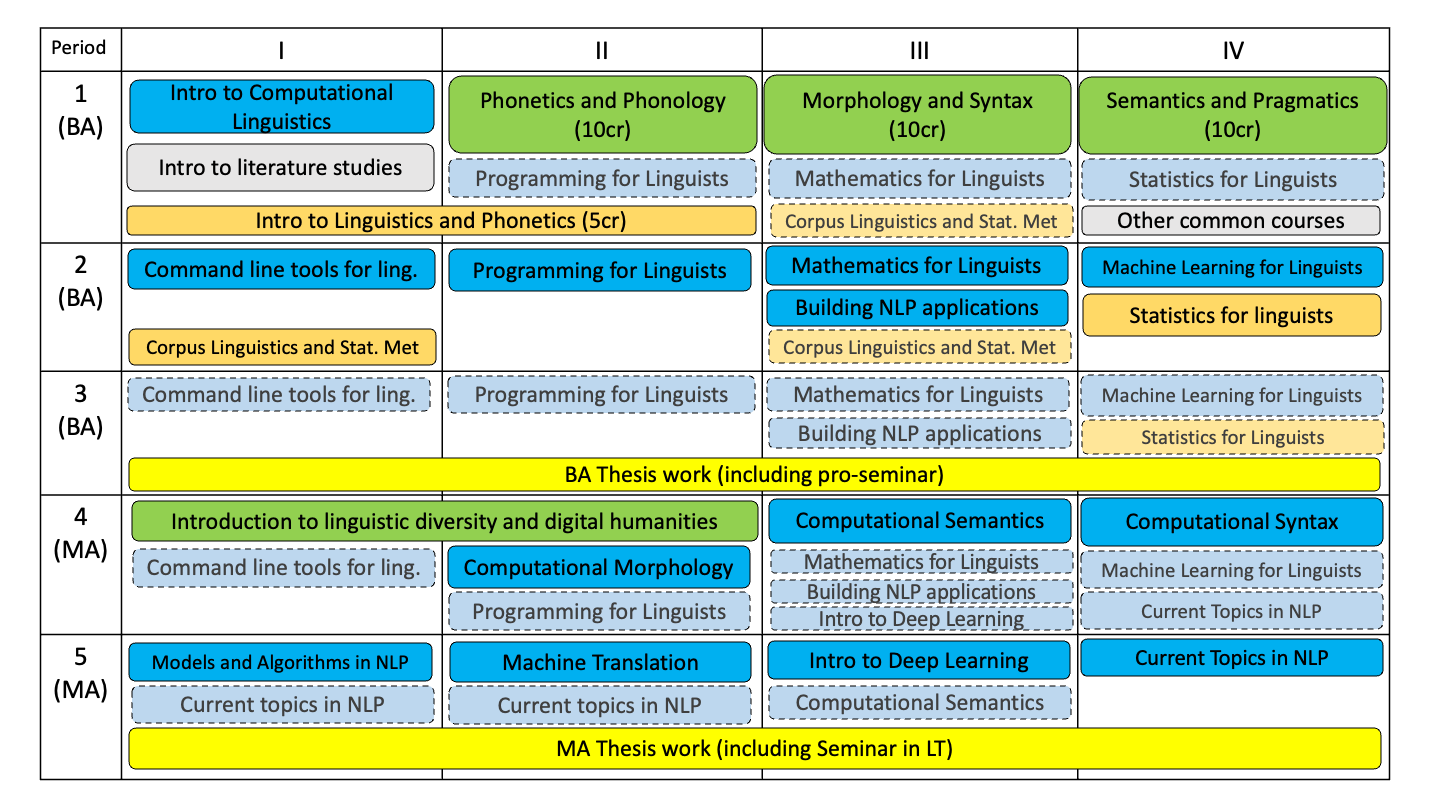Language technology is a truly interdisciplinary field that combines linguistics, computer science, information technology, mathematics, cognitive science, phonetics, psychology, translation studies and research artificial intelligence. In practice, language technology focuses on the machine-assisted modelling and processing of natural language. Language technology includes theoretical research in computational linguistics and the development of real-world applications such as grammar checkers, proofreading tools, information retrieval engines, speech recognition and synthesis, machine translation and intelligent interactive systems.
At the University of Helsinki, you can study courses in language technology within the BA in Languages (as part of the language sciences, i.e., linguistics, study track) and in the MA of Linguistic Diversity and Digital Humanities (LingDig, formerly LingDA). For more information about specific courses, please have a look at our course overview. For our LingDig students we also have more information in Moodle: LingDig student info.
We also have a list of recent PhD and master’s theses in language technology, a list of project proposals and ideas and a form for students looking for project supervisors.
The following picture illustrates studies in language technology at the BA and MA level. Columns are study periods and rows are academic years starting with the fall semester. You can click on the image to view it in larger size:
- Green boxes indicate common courses for all students of the language sciences study track at BA level and one common course for all students of the MA programme.
- Blue boxes mark courses in language technology , some of which are compulsory and some optional. The brightly colored boxes indicate the recommended time to take the courses, but alternative times are possible as well as indicated using a pale blue color with dashed boundaries.
- Orange boxes show a selection of BA courses in general linguistics
- Grey boxes mark a few courses that are common for the entire BA programme
Language technology is part of the language sciences track at the BA level. Students who have taken this track are automatically admitted to LingDig, our MA programme, and may choose the language technology track at the master level.
During the years 2017–2019 our master’s programme was called LingDA: Linguistic Diversity in the Digital Age. From the point of view of a language technology student, the renewed LingDig programme is essentially the same as LingDA, but LingDig incorporates two new study tracks, Cognitive Science and Digital Humanities, and offers a larger selection of courses.
If you have started your studies before 2017, take a look at the course correspondences in the old and new curricula. You can also read about the module structure that was in use 2017 – 2022.
BA in Languages: Language Sciences Study Track
To study language technology on the bachelor level you need to enrol in the bachelor programme of Languages and its Language Sciences study track. Your specialisation will take place within the scope of the modules KIK-LG100 Linguistics, Basic Studies (30 ECTS) and KIK-LG200 Linguistics, Intermediate Studies (40 ECTS). These modules cover general linguistics and phonetics in addition to language technology:
- Pick Linguistics as your study track (opintosuunta) to see the full structure of your bachelor studies behind this link.
- Another picture of the overall structure of the degree in the Bachelor Programme of Languages (in Finnish)
MA in Linguistic Diversity and Digital Humanities (LingDig): Language Technology Track
If you want to specialise in language technology on master’s level then you will need to enrol in the Language Technology study track of the LingDig master’s programme. You will take the module LDA-T300 Language Technology, Advanced Studies, which includes 90 ECTS credits in total:
Depending on your background and interests there are many options of courses to choose among and we also collaborate with the MSc programme in data science.
Optional study modules when studying language technology as a minor
You can also study language technology as an optional module within other programmes.
On bachelor level, language technology can be studied as part of these optional modules:
- KIK-LG510: Linguistics, Optional Basic Studies (30 ECTS)
- KIK-LG500: Linguistics, Optional Intermediate Studies (30 ECTS)
- KIK-LG520: Linguistics, Smaller Module of Optional Studies (15 ECTS)
- KIK-LG540: Language Technology, Optional Studies (15 ECTS of exclusively courses in language technology)
By completing KIK-LG510 and KIK-LG500 you have the right to continue to the LingDig master’s programme straight from your bachelor studies without participating in the separate application and admission process.
We offer the following two optional modules on master’s level:
- LDA-TA500: Essentials in Language Technology (15 ECTS)
- LDA-TB500: Comprehensive Specialisation in Language Technology (30 ECTS)
Its is, of course, also possible to register for individual courses if you meet the prerequisites and sufficient space is available. Please, have a look at our current courses and feel free to contact Jörg Tiedemann or Mathias Creutz (firstname dot lastname at helsinki dot fi) in case of further questions.
Career prospects
In addition to the businesses in their own field, language technology graduates usually find employment in information technology, translation services, telecommunications as well as at software and publishing houses. However, their background, which combines the humanities and technology in a diverse fashion, opens doors to other kinds of employment, such the career of a software entrepreneur. It should be observed that as a major subject, language technology does not provide the opportunity to acquire teaching qualifications.

